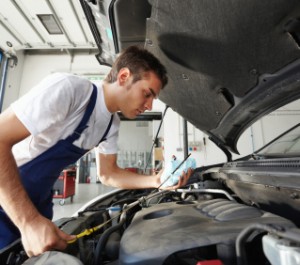One of the most critical safety systems in your car are your brakes, and yet it is the one that people most often neglect. The Department of Transportation reports that failing brakes account for 25% of all pre-crash events. This means that a quarter of cars that have crashed from system failure, were due to the brakes.
The anatomy of a brake is fairly simple. Most cars use what is known as a “disc brake.” It is comprised of a large metal disc called a “rotor” that sits between a clamp. This clamp holds two brake pads on each side to serve as buffers. Brake fluid is pumped into this system, and when you apply pressure, the pads clamp the rotor to stop your vehicle. Although it seems easy enough, a multitude of car issues can spring from this system. There are always several indications that your brakes need service, some more obvious than others.
Obvious Signs
- The brake service light has come on, meaning it is time for maintenance.
- The brake pedal is compressed mostly or completely to the floor before reacting.
- It is taking longer to stop than normal.
If it was that simple, the list would stop there. Sometimes, however, indicators fault, lights go out, and the obvious is no longer sufficient to diagnose a problem. That is when it becomes imperative to know about the “other” warning signs.
The Squeal
 A sound usually associated with brakes, few people understand the urgency of the message. Most manufacturers include a small sensor on the brake pad itself that emits a high frequency pitch when the pads are grinding. If the material wears down to the point where less than ¼ inch is left, the squeal will let you know. If this is the case, it is best to have your brake pads replaced immediately in order to keep the rotors intact.
A sound usually associated with brakes, few people understand the urgency of the message. Most manufacturers include a small sensor on the brake pad itself that emits a high frequency pitch when the pads are grinding. If the material wears down to the point where less than ¼ inch is left, the squeal will let you know. If this is the case, it is best to have your brake pads replaced immediately in order to keep the rotors intact.
Pulling
When your car jeers, it may not always be the steering. The caliper is a metal piece that serves as the framework to hold the brake pads in place. When the piece sticks, which is usually in one of the two front wheels, it will pitch the car in whatever direction the tire with the working caliper is in. This will be translated into pulling in your steering wheel. If your steering is working properly, this behavior can be a good indication that your brakes need service.
Bad Vibrations
When a car has an anti-lock brake system, pressure is applied in spurts to the rotor, which in turn causes a vibration while stopping. This is generally normal, but if your car does not have anti-lock brakes, then this is a sure sign of a warped rotor. The damaged rotor may thrum against the brake pads, and the feedback will be felt as vibrations through your brakes and steering column. Rotors only warp under extreme pressure, like constantly braking on hills or in instances of high heat. Nevertheless, if your rotor(s) go, they must be immediately replaced in order to maintain a functioning vehicle.
Understanding your car’s brakes and the different issues involved can be a daunting task. If you’d like to know more about brake systems and maintenance or have any questions at all, stop by our Hyde Park, MA location, or contact us to schedule a personal consultation.
Call at (617) 361-3100 today!
Central Automotive is proud to serve Hyde Park, MA and the surrounding areas of Dedham, MA; Roslindale, MA; Dorchester, MA; Milton, MA; Mattapan, MA; Jamaica Plain, MA; and more!


